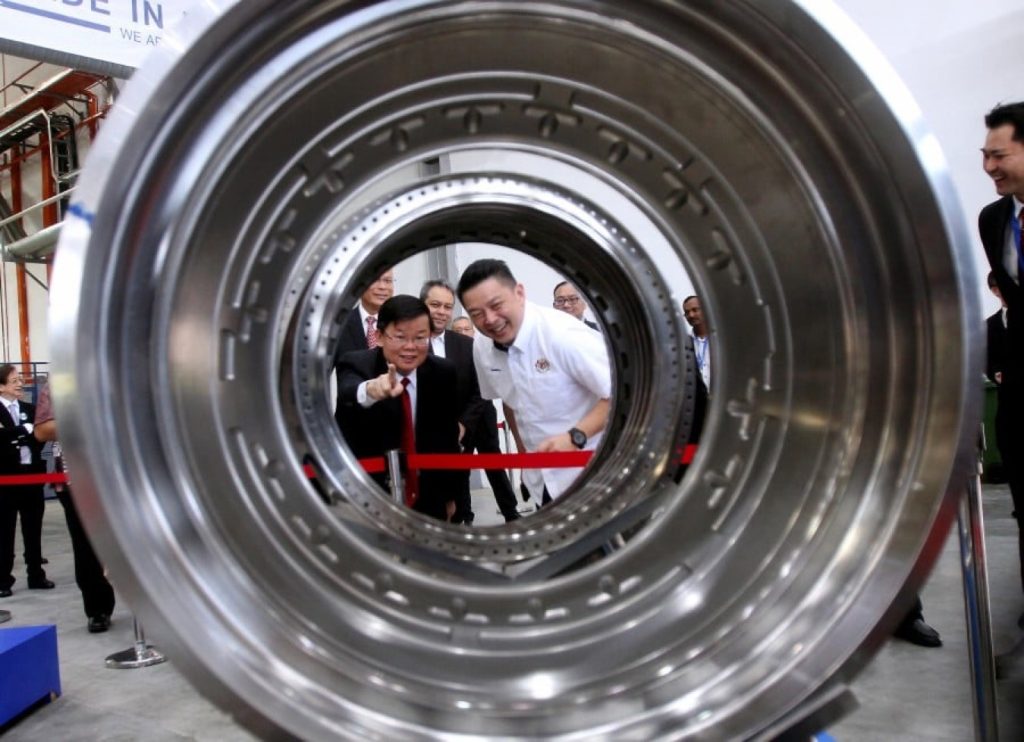From Marginal to Central: The Rise of Malaysia in the Aerospace Industry
In recent times, Malaysia has swiftly emerged as a key contributor to the global aerospace supply chain, marking its evolution from a marginal role to a primary center for aerospace manufacturing and services. This significant change has been largely fueled by strategic partnerships between government bodies and private industries, strong foreign direct investments, and a steadfast dedication to sustainability.
Currently, Malaysia is home to various aerospace parks, including Subang Aerotech Park, KLIA Aeropolis, UMW High-Value Manufacturing Park, Senai Airport Aviation Park, Nusajaya Tech Park, and Kulim Hi-Tech Park. These parks offer investors options for ready-made facilities or plots of land for tailored developments, simplifying the process of actualizing investments within the nation.

Minister of International Trade and Industry Datuk Ignatius Darell Leiking (right) made known that Malaysia was eyeing to become the leading aerospace nation in South East Asia by 2030, with a targeted annual revenue of RM55.2 billion. Picture: BERNAMA
Strategic Public-Private Partnerships and Foreign Direct Investments
Central to Malaysia’s rise in the aerospace sector are the strategic alliances between public and private entities. The Malaysian government, recognizing the potential of the aerospace sector as a key driver of economic growth, has been instrumental in facilitating an environment conducive to growth and innovation. Initiatives like the Malaysian Aerospace Industry Blueprint 2030 have laid down a comprehensive roadmap aiming at enhancing the country’s competitiveness in the global aerospace market. The Malaysian government, through agencies such as the Malaysia Aerospace Industry Association (MAIA), has been instrumental in crafting policies that support industry growth. These policies have been geared towards enhancing Malaysia’s attractiveness as an investment destination for aerospace manufacturing and MRO (Maintenance, Repair, and Overhaul) activities. This has led to the transfer of technology, skills, and expertise, further strengthening the local aerospace ecosystem.
These governmental efforts have been complemented by robust participation from private entities, both local and international, fostering an ecosystem ripe for technological innovation and skill development. Companies have been encouraged to set up manufacturing and service facilities in Malaysia, aided by favourable policies and incentives, thereby creating a synergistic environment that benefits all stakeholders involved. Boss Aerosystem Sdn. Bhd., a wholly-owned Malaysian manufacturer and fabricator of aerospace component, expanded its operation in Bukit Minyak Industrial Park, Pulau Pinang.
Examples of these collaborative efforts include partnerships between the Malaysian government and global aerospace leaders such as Airbus and Boeing, which have established significant manufacturing and service centers in the country. Local companies like CTRM Aero Composites in Melaka have partnered with international firms to supply components for major aircraft programs. It specializes in the production of composite components and has been involved in supplying parts for major aircraft manufacturers like Airbus and Boeing. Additionally, initiatives like the Aerospace Malaysia Innovation Centre (AMIC) illustrate collaboration between universities, government, and industry to advance research and workforce training. These actions, supported by incentives like the Principal Hub scheme and tax exemptions, have attracted both domestic and foreign companies to contribute to a dynamic aerospace ecosystem in Malaysia.
MATRADE’s Global Sourcing & Partner Development Programme
One of the crucial initiatives driving the integration of Malaysian companies into the international aerospace scene is the Malaysia External Trade Development Corporation’s (MATRADE) Global Sourcing & Partner Development Programme. This program aims to match Malaysian aerospace companies with global players, facilitating partnerships, joint ventures, and supply chain integration.
Through the Global Sourcing & Partner Development Programme, MATRADE organizes targeted business-to-business (B2B) matchmaking sessions where Malaysian companies can meet with potential international partners. These sessions have led to successful collaborations between Malaysian companies and leading aerospace firms, fostering joint ventures and supply agreements. The Aerospace Supplier Excellence Programme, a key component of MATRADE’s efforts, assists Malaysian suppliers in meeting the rigorous demands of worldwide aerospace entities. Companies like SME Aerospace (SMEA) have seen considerable benefits from this program, achieving contracts and building connections with global powerhouses such as Rolls-Royce and Airbus. These successes not only enrich their business offerings but also set new standards for quality and trustworthiness in the sector.
Sustainability: A Core Component of Malaysia’s Aerospace Strategy
Sustainability is at the heart of Malaysia’s approach to aerospace. Through innovations in green technology and sustainable practices, Malaysia is aligning its aerospace ambitions with global sustainability goals. This commitment to sustainability is evident in the adoption of cleaner, more efficient manufacturing processes and the exploration of sustainable aviation fuels. Companies like Aerospace Composites Malaysia Sdn Bhd, a joint venture between Boeing and Hexcel, are innovating in the production of lighter and more fuel-efficient composite materials for aircraft. This not only enhances the performance and efficiency of airplanes but also reduces the overall environmental impact.
For global businesses, this evolution represents an opportunity to tap into Malaysia’s growing aerospace sector for outsourcing, joint ventures, or as a new market for aerospace products and services. The emphasis on sustainability within Malaysia’s aerospace strategy also aligns with the increasing global trend towards environmentally friendly business practices, offering companies a way to reduce their environmental footprint while maintaining high standards of quality and innovation. To see how GetAhead can help, contact us here: https://getahead-asia.com/calendar/


